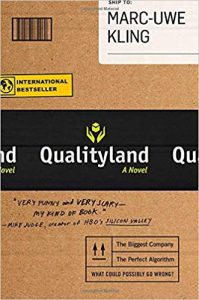Ian Mond Reviews Qualityland by Marc-Uwe Kling
 Qualityland, Marc-Uwe Kling (Grand Central Publishing 978-1-538-73296-0, $27.00, 352pp, hc) January 2020.
Qualityland, Marc-Uwe Kling (Grand Central Publishing 978-1-538-73296-0, $27.00, 352pp, hc) January 2020.
Like Joanna Kavenna’s Zed, Marc-Uwe Kling’s Qualityland (translated by Jamie Searle Romanelli) portrays a society, decades from now, totally in thrall to the predictive power of algorithms. The world of Qualityland, though, is not one that’s immediately recognisable. Aside from a handful of references to “Zuckerberg Park” and “Michael Bay Boulevard,” the titular setting and its capital, QualityCity, is so bland, so devoid of cultural signifiers, it could be anywhere on Earth. This homogeneity is deliberate. As the QualityLand travel guide informs us, following an “economic crisis of such severity that it became known as the crisis of the century,” it was recommended by a consultant that the country needed a new name:
The old one was worn-out and, according to surveys, only inspired die-hard nationalists with minimal buying power. Not to mention the fact that the renaming would also divest the country of a few unpleasant historical responsibilities in the process.
People’s surnames also change to be more in line with “the new progress-orientated country identity.” From birth, every boy is given his “father’s occupation as a surname and every girl the occupation of her mother.” It doesn’t end there. The citizens of QualityLand are ranked from 0 to 100, with those unfortunate enough to have a single-digit level referred to unofficially as “the Useless.”
Cue our hero Peter Jobless. After he is dumped by his girlfriend, Sandra Admin, when she finds a more suitable companion on the QualityPartner app, his rank drops below 10. In response, Peter’s friends do the sensible thing of unfriending him because he “could have a negative impact on their own levels.” His only companions are the rejected QualityPads, sex-bots, drones, and droids (including a 2.56-metre-tall combat robot) that, as a Scrap-Metal-Press-Operator, he has been tasked to destroy but instead let live in his cellar spending most of their time watching the Terminator octet. Things take a turn for the weird, though, when TheShop (“The World’s most popular online retailer”) sends Peter a pink dolphin vibrator and then refuses to take it back despite his repeated protestations. Unwilling to drop the matter and just throw the sex-aid in the trash, Peter commits to returning the pink dolphin vibrator even if it means personally handing it over to TheShop’s aloof, intimidating CEO, Henryk Engineer.
Qualityland owes a considerable debt to Douglas Adams (something the publisher makes a point of on the back cover copy of the book). The novel features a cornucopia of faulty AI appliances that might have rolled off the conveyor belt at the Sirius Cybernetics Corporation, an earworm, or “worm-like mini-robot” that “crawls down into the ear canal” and connects a person to the internet, and a hapless and awkward hero who would make a great stand-in for Arthur Dent if Dent was unavailable to travel the galaxy with Ford Prefect. While these echoes of Adams’s work are a little distracting at times, the novel isn’t a cheap Hitchiker’s Guide to the Galaxy knock-off. Kling’s dialogue is witty and sharp, the relationship between Peter and the droids is handled with a great deal of humour and warmth, and more often than not Kling lands his jokes – Qualityland is incredibly funny – a rare feat for a science fiction novel.
It’s not just about the gags though. Like Tim Maughan and Joanna Kavenna, Kling has concerns about Surveillance Capitalism: algorithms and machine learning that will not only keep an eye on everyone but will determine our social status while drowning us in products we don’t want. It’s a frightening picture that, for all the jokes about dolphin vibrators and combat robots suffering from post-traumatic stress disorder, is never downplayed. A second narrative strand, dealing with an election campaign where one of the candidates is an android – his name is John – recognises that these very same algorithms will be pivotal to the emergence of self-aware artificial intelligence. Kling seems agnostic as to whether this will be positive for humanity or lead to the extinction of the species. On the one hand, John is a wonderful character, his policies intended to create a more equitable society where no-one is ranked based on their profile and where companies are forbidden from fueling their algorithms with harvested private information. However, a fascinating conversation between Peter and a character known as the old man – who remembers a time before QualityLand – comes to the less-than-comforting conclusion that even a benign or benevolent super AI will ultimately make us redundant. Just as with Zed and its interrogation into the problem of free-will, it’s Kling’s insight into artificial intelligence that, alongside the jokes and absurd set-pieces, makes Qualityland such a rewarding read.
Ian Mond loves to talk about books. For eight years he co-hosted a book podcast, The Writer and the Critic, with Kirstyn McDermott. Recently he has revived his blog, The Hysterical Hamster, and is again posting mostly vulgar reviews on an eclectic range of literary and genre novels. You can also follow Ian on Twitter (@Mondyboy) or contact him at mondyboy74@gmail.com.
This review and more like it in the January 2020 issue of Locus.
 While you are here, please take a moment to support Locus with a one-time or recurring donation. We rely on reader donations to keep the magazine and site going, and would like to keep the site paywall free, but WE NEED YOUR FINANCIAL SUPPORT to continue quality coverage of the science fiction and fantasy field.
While you are here, please take a moment to support Locus with a one-time or recurring donation. We rely on reader donations to keep the magazine and site going, and would like to keep the site paywall free, but WE NEED YOUR FINANCIAL SUPPORT to continue quality coverage of the science fiction and fantasy field.






